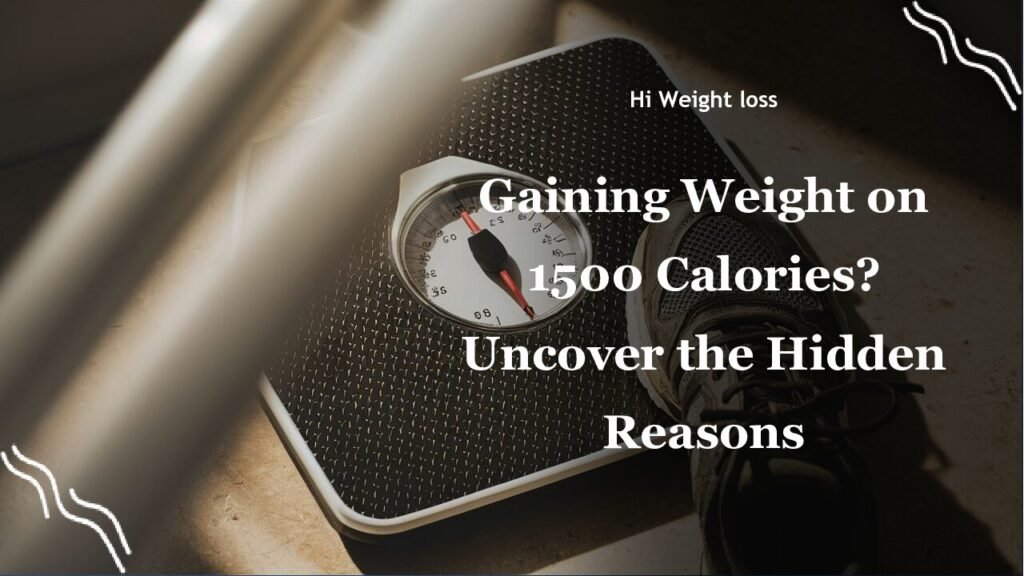Are you struggling with unexpected weight gain despite diligently following a 1500-calorie diet? It can be incredibly frustrating to meticulously track your meals, only to see the numbers on the scale creeping up. The good news is, you’re not alone, and this is not as uncommon as you might think. This article will explore the various reasons why you might be gaining weight on a 1500-calorie diet, and provide a comprehensive guide to help you understand your body’s unique needs and achieve your health goals.
Why Am I Gaining Weight on a 1500 Calorie Diet?
It’s a common misconception that a 1500-calorie diet is a one-size-fits-all solution for weight loss. Many people find that this calorie intake often leads to weight loss, but it’s not always the case. Several factors play a significant role in determining whether 1500 calories will lead to weight gain or loss. Understanding these factors is key to unlocking your weight management journey.
Understanding Your Basal Metabolic Rate (BMR)
Your Basal Metabolic Rate, or BMR, is the number of calories your body burns at rest to keep essential functions going. This is influenced by several factors, including your age, height, weight, and sex. For instance, as cited by Livestrong.com, a 70-year-old woman weighing 90 pounds and standing 5 feet 2 inches tall has a BMR of approximately 1010 calories.
Now let’s take a moment to illustrate how this plays out in real life. My Aunt Susan, who is petite and has always been on the smaller side, noticed that she started gaining weight, despite only eating about 1500 calories a day. After consulting a nutritionist, she learned that her BMR was quite low due to her age and stature. Therefore, a 1500 calorie intake was actually above her maintenance level, causing her to gain weight. This experience highlighted the critical role of BMR in dietary planning.
If you don’t take your BMR into account, you might find yourself eating more calories than your body needs to maintain its current weight, even on a 1500-calorie diet. It’s an important consideration for anyone managing their weight.
The Impact of Your Activity Level
Your daily activity level is another major determinant of your caloric needs. Someone who has a job sitting all day and gets minimal exercise requires fewer calories than someone who is extremely active. According to a study from Livestrong.com, a sedentary person should multiply their BMR by 1.2, while a moderately active person should multiply by 1.55. Highly active individuals, meanwhile, might need to multiply their BMR by 1.9.
Let’s consider another scenario, I know a friend who thought he could lose weight eating 1500 calories a day; However, he works at his desk all day, and when he went to the gym, the frequency and intensity of exercise were not high, and he usually only did 2-3 exercises, each for 10 minutes. In this case, multiplying his BMR by 1.2, he will definitely find that 1500 calories is more than he needs, leading to weight gain, rather than loss.
It is very important to be honest with yourself about your activity level, if you only walk 2000-3000 steps a day, this doesn’t count as highly active. If you eat 1500 calories without moving a lot, it might not be low enough for weight loss and can lead to weight gain.
The Influence of Age and Body Composition
As we age, we often experience a decrease in muscle mass. This is significant because muscle burns more calories than fat, even at rest. So, as you lose muscle, your body’s caloric needs also decrease. Both your height and weight affect your body composition, as larger individuals need more energy just to move around. This is why it’s often said that a diet must be personalized to fit your specific body type, age, and gender.
A few years ago, my grandfather noticed that he wasn’t losing weight as easily as he used to, even though he was eating similar portions. He learned from his doctor that his muscle mass had decreased with age, thus lowering his overall caloric needs. Consequently, the same number of calories he used to maintain his weight was now contributing to weight gain. This is a classic example of how age and body composition impact caloric needs.
Remember, your metabolism isn’t static, it shifts with your life experiences and body composition changes. So, what worked for you at 20 might not work the same way when you’re 40 or 60. Paying attention to these details is critical for sustainable weight management.

Insufficient Caloric Deficit and Weight Gain
If you’re gaining weight on a 1500-calorie diet, it may simply be that you’re not creating a caloric deficit. A caloric deficit is when you’re consistently consuming fewer calories than your body burns. If your actual caloric needs are higher than 1500 calories, you won’t be in a deficit, and weight loss is unlikely. You may find that the information on Medical News Today could help you learn more about the 1500 calorie diet.
A friend of mine had a rather eye-opening experience; she thought 1500 calories was automatically a weight-loss diet for everyone. But when she started gaining weight, she had to delve into her daily routines, and found that her daily walks, gardening, and work were actually consuming far more calories than she initially thought. This meant she wasn’t creating a calorie deficit at 1500 calories. Her experience highlights the fact that there is no “magic number” for everyone.
Therefore, it is very important to accurately calculate your caloric needs. To do this, you need to calculate your BMR and adjust it based on your activity level. This will give you a more realistic target for your caloric intake.
Muscle Loss and Its Impact on Metabolism
When you lose muscle mass, your overall caloric needs decrease. This is because muscle tissue burns more calories than fat tissue, even when your body is at rest. So, if you are primarily losing muscle, rather than fat while trying to lose weight, your body’s need for calories will decrease and can lead to weight gain if your caloric intake remains unchanged.
I went through a similar experience in my mid-thirties when I embarked on a weight loss journey. I focused more on diet, and less on strength training, which meant I didn’t retain my muscle mass. After a while, I realized that I wasn’t making much progress with weight loss, and was actually gaining, despite eating a low-calorie diet. After speaking to a trainer, I realized that losing muscle actually decreases my caloric needs. This experience made me realize that I had to add strength training to my routines.
If you’re focused on weight management, it’s important to include regular resistance training to help maintain or build muscle mass, this ensures your metabolism remains as active as possible.
Inaccurate Calculation of Caloric Needs
It’s also very possible that your individual caloric needs are different from the generally accepted guideline of 1500 calories. Perhaps you are not correctly calculating your calorie intake, or you are underestimating the calories you consume. This is a common mistake and can make a big difference in whether you are gaining or losing weight. For example, according to Healthline, the general 1500 calorie diet isn’t for everyone, and you can learn more about it by going through this Healthline article.
I remember how one of my coworkers kept gaining weight when following an online diet program that recommended 1500 calories. He thought he was eating 1500 calories, but after going through his meals with a nutritionist, he realized he was actually consuming about 1800 calories a day. He was miscalculating his intake and not accounting for small snacks, which made a big difference in the long run. This is a classic case of inaccurate calculation of caloric needs, which shows how easy it is to lose track of how much you are eating.
You may need to meticulously track everything you eat to ensure accuracy, and you can seek advice from a nutritionist to better understand what’s best for you.
Practical Steps for Assessing Your Caloric Needs
Here are some practical steps to figure out what’s going on with your body. Firstly, use an online calculator to calculate your BMR and then adjust this based on your activity level. The second thing you need to do is to track your food intake accurately, and make sure you are not miscalculating or underestimating how much you are eating. Finally, pay attention to your body’s signals, if you are consistently gaining weight on a 1500 calorie diet, it may be time to reevaluate your needs.
Remember, your dietary needs and calorie intake are not static, they can change over time. So it’s a good idea to reassess them regularly to ensure you are staying on the right track.
| Factor | Description | Adjustment |
|---|---|---|
| BMR | Calories burned at rest | Base Value |
| Sedentary | Minimal activity | BMR x 1.2 |
| Moderately Active | Some physical activity | BMR x 1.55 |
| Highly Active | Daily vigorous exercise | BMR x 1.9 |
| Muscle Mass Loss | Decrease in muscle | Decreases Caloric Needs |
Conclusion
Gaining weight on a 1500-calorie diet is perplexing but can be explained by various individual factors, including an insufficient caloric deficit, loss of muscle mass, or inaccurate calculation of caloric needs. Everyone’s body is different, and what works for one person may not work for another. By understanding your BMR, activity level, age, and body composition, you can better understand your unique caloric requirements. Be sure to meticulously track your food intake and make adjustments based on what your body is telling you.
If you are still struggling with weight gain despite eating 1500 calories, you should consider consulting a healthcare professional or a certified nutritionist. They will be able to help you tailor a personalized diet that takes into account your specific needs and goals, and that is something that you will need in your weight management journey. Ultimately, weight management is a personalized journey that requires a thorough understanding of your own body, and the right guidance.
If you found this article useful, don’t hesitate to share it with your friends, or anyone else that you think might be experiencing this problem!
FAQ
Is 1500 calories a good amount for weight loss?
For many people, 1500 calories can be an effective target for weight loss, however, this will depend on a variety of individual factors. It is important to calculate your BMR and activity level to determine if it is the right amount for you.
Can I gain weight on a 1500 calorie diet?
Yes, it is possible to gain weight on a 1500-calorie diet if your actual caloric needs are lower than this or if you are losing muscle mass, which will decrease your caloric needs.
What if I’m not losing weight on 1500 calories?
If you are not losing weight on 1500 calories, it could be that your caloric needs are less than this number, or you are losing muscle mass, which means your caloric needs are decreasing, or you are miscalculating your calorie intake. Try recalculating your BMR and activity level and track your intake meticulously, or consult a professional if necessary.
How can I ensure I am not losing muscle while losing weight?
To minimize muscle loss while losing weight, make sure to include regular resistance training in your workouts. Be sure to also eat sufficient protein in your diet to support muscle maintenance.
Should I consult a doctor?
If you are consistently gaining weight despite following a diet, it is a good idea to consult a health professional, who may also recommend that you see a nutritionist to determine the reasons behind your weight gain and provide a tailored solution for your specific needs.



